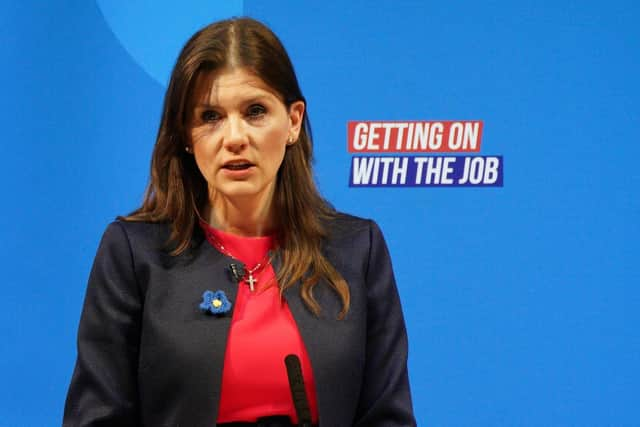Culture secretary Michelle Donelan is right to re-examine privatisation of Channel 4 - David Behrens
Gove, you will recall, was the shameless minister in charge of levelling up the North – a region he had made less level during his time as Education Secretary by imposing his Eton-esque English Baccalaureate on working-class teenagers who would have rather studied metalwork than mathematics. That was an irony that appeared completely lost on him.
Dorries, meanwhile, was an opportunist MP who somehow managed to become the country’s arbiter of culture on the basis of having skived off to compete on I’m a Celebrity… Get Me Out of Here. She treated her role as Culture Secretary as if it too were a game, gambling the fortunes of Channel 4 and the BBC as if picking the key to Box 13.
Advertisement
Hide AdAdvertisement
Hide AdHer successor, Michelle Donelan, appears to be more pragmatic, promising to re-examine the case for Ms Dorries’ flagship policy of privatising Channel 4. It should not take her long to discover that it is non-existent.


The outlook for the BBC, though, is cloudier than ever on her watch. A long-term sceptic of funding it by a tax on owning a TV, she believes the licence fee should be abolished.
Unlike her predecessor, she has experience of actually working in television, sort of – having marketed a wrestling channel before going into politics. In that job, the aggression was mostly theatrical; at Westminster they’re not kidding.
She is right that the licence fee is not sustainable in the long term – not when the BBC itself has set out its stall on prioritising online content over broadcasting. But with both it and Channel 4 riding a financial rollercoaster, it’s worth comparing their contributions to the nation’s cultural life, especially during the schedule upheaval of the last two weeks.
Advertisement
Hide AdAdvertisement
Hide AdIt is to the BBC that Britain traditionally turns at times of national events, and this was no exception. Their coverage was as immaculate as we might have expected, given that they had been literally rehearsing it for 70 years. But if it was light and shade you were seeking, you had to look elsewhere.
It was the corporation’s view that entertainment was by its nature disrespectful. Comedy in particular was jettisoned in favour of endless interviews with people telling us what a wonderful sense of humour the late Queen had. There’s another irony that went mostly unnoticed.
In contrast, Channel 4 went ahead last weekend with The Last Leg, its satirical take on the news. The result was both respectful and funny – more so, dare I say, than on a normal week – and why should it not have been? Since Swift, intelligent satire has helped square the nation’s moral compass, and it has never been incompatible with deference.
The BBC had forgotten what it learned long ago. On November 23 1963, the day after President Kennedy was assassinated, it pressed ahead with the live transmission of That Was The Week That Was, TV’s first successful foray into satire, and a show whose political invective was savage even by today’s standards. TW3 was considered by many to be positively sacrilegious, and the transmission of such inflammatory material at a sensitive time would be unconscionable today. Yet that night’s edition, devoted entirely to Kennedy’s loss and legacy, was a landmark in broadcasting history – a tribute so eloquent and moving that its soundtrack was released on record and the telerecording shown in America the following evening.
Advertisement
Hide AdAdvertisement
Hide AdThis was an act of creative courage that simply could not happen in today’s BBC. It is an institution obsessed with looking over its shoulder to the extent that even in its centenary year it is self-conscious about blowing its own trumpet. Worse, it has become utterly out of control, riding roughshod over commercial competition in its aggressive, unmandated appropriation of the internet. If a private corporation had behaved as badly it would have been legislated out of existence by the competition commission.
It has been Michelle Donelan’s contention that the BBC must exist within the rules of the market, not outside them. That’s exactly what Channel 4 already does, and far from being threatened with emasculation, it should be held up as an example to the corporation. It was Nadine Dorries’ mistake not to realise this.
Broadcasting, like Britain itself, is entering a new era, and the BBC will have to decide whether it is to move forward as an impeccable public broadcaster or as a multimedia monster. It’s becoming increasingly clear that it can’t be both – but it’s a decision too important to be turned into a political game show.